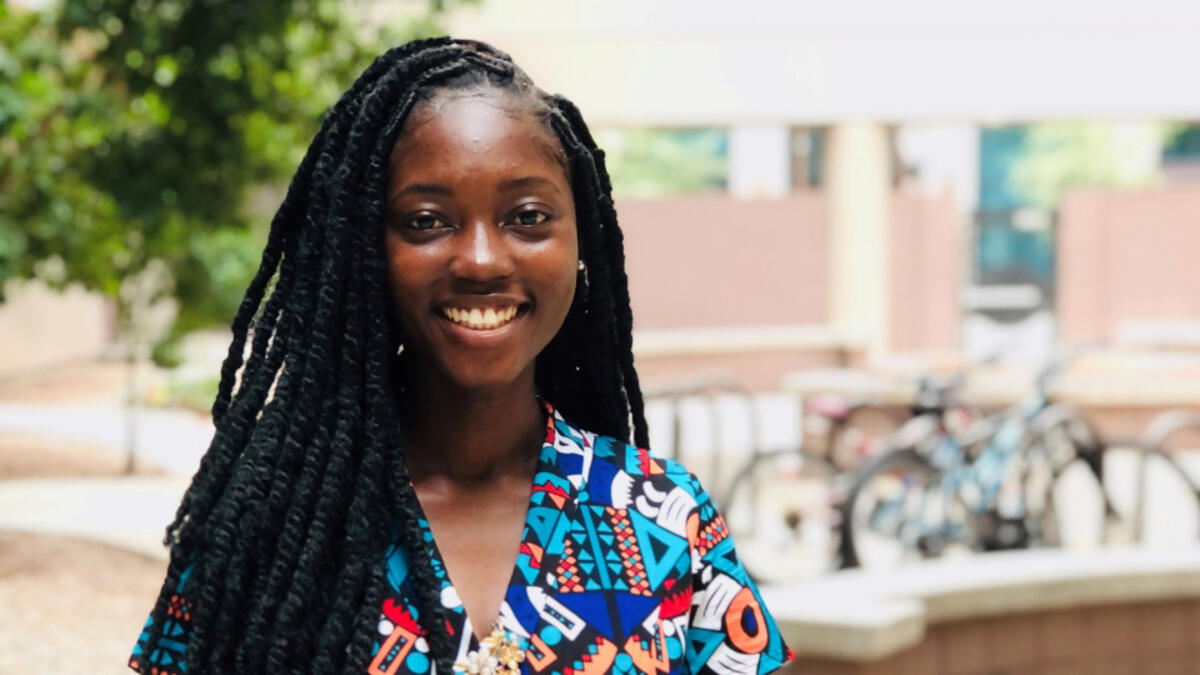Editor's note: ASU News is highlighting some of its impressive incoming students for fall 2021.
When Doreen Marfo was growing up in Ghana with her grandparents, they didn’t have access to electricity. Areas with electricity were very difficult to tap into because there were no transmission lines. Marfo decided she wanted to do something to get electricity to her village.
That was years ago now, and although the village has electricity, the grid could be more robust. This fall, Marfo begins work at Arizona State University on a master’s degree in electrical engineering with a focus on power and energy systems.
“That's why I'm majoring in that in order to get the exposure and experience to go and help my country,” she said.
ASU News asked this incoming student a few questions about becoming a Sun Devil:
Question: Why did you choose ASU?
Answer: Because ASU is No. 1 in innovation. And I read about the power system laboratories and research centers. It's very huge and having good professors like Dr. Vijay Vittal and Dr. Raja Ayyanar and very robust professors who can really equip you in the power sector. And again, Arizona’s weather is equivalent to what we have in Ghana. And so I just said, why not? Let me just come, and it will be very easy to fit in.
Q: What are you most excited to experience your first semester?
A: I'm looking forward to an exciting semester and collaborating with professors in terms of research and even students as well. I'm looking forward to joining the National Society of Black Engineers and even the Fulton Engineering Center, engaging in community services that will enhance people's live here and even back home. And I can't wait for a successful semester.
Q: What do you like to brag about to friends about ASU?
A: ASU has a very nice community, and it's very different from what is in Ghana. … The school is so huge, more like a town or city back home. And it's a very large community and people are always willing to offer help wherever you are when you're lost. … And I want to share that with my friends as well.
Q: What’s one interesting fact about yourself that only your friends know?
A: I'm a twin — and I miss her already.
Q: If someone gave you $40 million to solve one problem in our world, what would you choose?
A: One thing I'm passionate about is helping home in terms of the power system. I did an internship this summer at Ghana Grid Company Ltd. And I had the opportunity to work with their system control center and also to get to know the transmission network of Ghana. And so I would love to invest in the security infrastructure of the whole network and to make it more robust, to accommodate enough power. Because the system keeps evolving, the network keeps going and we need to make it such that there will be some sort of redundancy in the network as time goes on so that we can accommodate the power that it needs and ensure security as well.
Top image courtesy of Doreen Marfo
More Science and technology

Hack like you 'meme' it
What do pepperoni pizza, cat memes and an online dojo have in common?It turns out, these are all essential elements of a great cybersecurity hacking competition.And experts at Arizona State…

ASU professor breeds new tomato variety, the 'Desert Dew'
In an era defined by climate volatility and resource scarcity, researchers are developing crops that can survive — and thrive — under pressure.One such innovation is the newly released tomato variety…

Science meets play: ASU researcher makes developmental science hands-on for families
On a Friday morning at the Edna Vihel Arts Center in Tempe, toddlers dip paint brushes into bright colors, decorating paper fish. Nearby, children chase bubbles and move to music, while…


